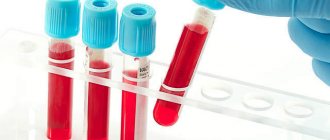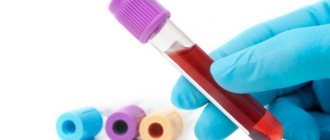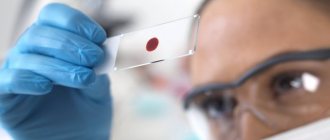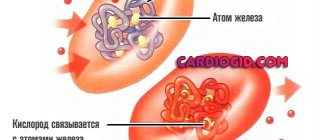Menopause is a natural process of attenuation of reproductive function in every woman, associated with a decrease in the amount of hormones produced in the body. For each representative of the fair sex, such hormonal changes are accompanied by various symptoms, but in any case there is a deterioration in the general condition and an exacerbation of pre-existing chronic diseases. Since the level of hormones changes significantly during menopause, the easiest way to make sure that menopause has really begun is by taking the appropriate tests.
In this article, we will describe exactly what hormones a woman needs to take for tests during menopause in order to verify its onset and select the appropriate medications to alleviate the symptoms of this period.
Why get tested?
All manifestations of menopause in women by the age of 50 are associated exclusively with hormonal disorders caused by the withering of the reproductive function of the female body. But the absence of menstruation is not always a sign of the onset of menopause; in order to determine the cause of one or another symptom, it is necessary to monitor the level of sex hormones in the blood. Women during menopause have precise norms, by comparing them with research results, appropriate conclusions can be drawn.
Based on the results of hormone tests, a gynecologist can prescribe hormone replacement therapy and thereby significantly alleviate the symptoms of menopause for a woman.
Additional examinations during menopause
If the patient has undergone a hormonal test, and it confirms the onset of menopause, and the doctor also suspects additional complications caused by hormonal changes, then the following studies may be prescribed:
- Ultrasound of the thyroid gland and pelvic organs;
- Ultrasound densitometry;
- smear for cervical cytology;
- mammography.
If the results of these studies are poor, you may additionally need to consult with specialized specialists (surgeon, gastroenterologist, oncologist, neurologist, etc.).
When is laboratory diagnostics necessary?
Laboratory diagnostics should be carried out at the stage of premenopause, when the symptoms of menopause are not clearly expressed, but the first changes in the functioning of the body have already begun. Hormone tests during menopause can provide all the information about these changes.
You should go to a gynecologist and get tested for female hormones during menopause if the following symptoms appear:
- irregular periods;
- unexpected bleeding from the uterus;
- severe joint pain;
- dizziness, general weakness and headaches;
- abnormal vaginal discharge;
- hot flashes and increased sweating.
What hormones need to be tested to find out whether menopause has begun or not?
It is impossible to prevent or delay the onset of menopause. This is a natural process of fading ovarian function, which affects the condition of the whole organism. Tests for menopause make it possible to identify the start time of this period and determine how correctly it is proceeding. Timely diagnosis will help, if necessary, choose the right treatment.
When should you get your hormones checked?
The average time to menopause is 50 years, but menopause symptoms appear much earlier. Sometimes hot flashes, mood swings or vaginal dryness begin to bother you before the age of 45. This indicates the possible onset of early menopause. This can be confirmed or refuted with the help of tests for female hormones, which during menopause differ from the reproductive period.
Changes in the sexual sphere before the age of 40, disruptions in the menstrual cycle, lack of ovulation may be evidence of ovarian exhaustion and premature menopause. If suspicious symptoms appear, a study of female hormones will help determine the onset of menopause or other diseases.
You need to undergo an examination if the following complaints appear:
- frequent delays in menstruation not associated with pregnancy;
- intermenstrual bleeding;
- lack of ovulation or inability to become pregnant;
- dryness and itching in the vagina with normal smears;
- hot flashes, sweating and pressure surges in women under 45 years of age.
Tests must be taken in preparation for IVF after 40 years to determine reproductive potential.
What changes occur in the production of hormones
For each woman, her own personal level of progesterone, estradiol, prolactin and other hormones is normal, and hormonal imbalance is accompanied by a significant deviation from their normal value.
Female hormones during menopause, or rather changes in their levels, lead to the following changes in the body:
- decreased testosterone leads to the accumulation of fat in the chest and abdomen, as well as decreased bone density. The normal level of this hormone in the blood is 70 ng/dl; during menopause, the level drops to 40 ng/dl;
- estradiol during menopause can fluctuate in the range of 9.7-82 pg/ml;
- Progesterone level allows you to assess the condition of the uterus. Its norm is 0.64 nmol/l. Problems with the production of progesterone lead to disruptions in the menstrual cycle;
- Prolactin decreases significantly during menopause, but changes in the level of this hormone do not have any special symptoms. Its norm at this time should be 25-400 mU/l. Prolactin levels decrease annually;
- the level of LH and FSH with the onset of menopause increases 5-fold and is about 40 mIU/ml.
List of diagnostic measures necessary for women after their fortieth birthday
Diagnostic measures for women after 40
The tests that women need to undergo during menopause are:
- Lipid testing. This blood test will allow you to diagnose disorders of fat metabolism, which affects the formation of atherosclerosis and diseases of the cardiovascular system. Determining the amount of high and low density lipoproteins also plays an important role. This is explained by the fact that with an increase in cholesterol and a decrease in lipoproteins, it becomes necessary to adjust the diet, change the usual lifestyle, and in some cases even take hormonal medications.
- Determination of thyroid hormone levels. Quite often, the cause of menstrual cycle disorders is a dysfunction of the thyroid gland. That is why, to exclude such problems, it is necessary to check thyroid-stimulating hormone and thyroxine.
- Blood test for glucose. This examination is included in the list of mandatory tests that must be completed if problems with the functioning of the body occur. This is especially true for women in the premenopausal period. An examination is carried out to exclude the presence of type 2 diabetes mellitus, heart and vascular diseases in the patient.
Since changes in the condition of the bones are observed over time, they become brittle and fragile, it becomes necessary to conduct an X-ray examination of bone density. This examination is carried out with special devices that minimize the radiation dose. It should be noted that this examination has a high degree of accuracy and allows you to determine at what stage osteoporosis is.
The list of these examinations is not that long, however, by passing them you can get a large amount of information about pathological and physiological changes in the body. And their early diagnosis will prevent the transition of pathological conditions to a chronic form and help eliminate them at the initial stages of development.
The body's response to hormonal changes
The most important process in the female body is metabolism, which is controlled by hormones. Various systems of the body take part in it, but its main task is to supply nutrients to various tissues, which ensures the normal functioning of the entire organism as a whole.
During menopause, hormonal levels change significantly, and these changes primarily negatively affect metabolism. Depending on the individual characteristics of the female body, signs of these changes may appear more or less pronounced, but almost every woman will experience the following body reactions:
- The level of female sex hormones decreases, and this affects not only the ability to conceive a child, but also the activity of the brain. The work schedule of some of its areas changes, and in particular the pituitary gland and hypothalamus, which take part in the production of sex hormones. Due to changes in the circulatory system of the upper body, there may be hot flashes in the face, neck and décolleté, dizziness, nausea, increased sweating and sudden changes in pressure;
- the balance of minerals in the body is also disturbed, which entails a decrease in the density of bone tissue and teeth;
- a reduced amount of hormones during menopause leads to problems with the thyroid gland, the production of thyroxine, which increases anxiety and increases the heart rate, is no longer suppressed;
- sex hormones are also responsible for the normal functioning of the adrenal glands; during menopause, hormonal disorders lead to malfunctions of this organ and, as a result, cause increased blood pressure and heart pain;
- hormonal changes also affect the functioning of the central nervous system, causing unreasonable fears, irritability, tearfulness and mood swings.
General information about menopause
Menopause or menopause is a normal physiological phenomenon, which is accompanied by an irreversible decline in ovarian function and hormonal changes. The average age of its onset is from 45 to 55 years. The process of maturation of eggs in a woman stops, and therefore menstruation no longer occurs.
Once menopause begins, a woman is no longer fertile. The level of sex hormones is sharply reduced or completely reduced to zero.
It is worth highlighting the gradual onset of menopause. Starting at age 30, progesterone and steroid estrogen levels decrease compared to younger ages. Ovulation becomes unstable and fewer eggs mature. The likelihood of pregnancy is slightly reduced.
The severity of hormonal changes increases by the age of 40. Ovulation and menstruation become irregular, and the volume of menstrual flow decreases. There are cases where a woman’s regular periods continue until the onset of menopause. However, such cases are the exception. A woman’s ability to conceive at this stage is minimized.
The main signs of the imminent onset of menopause include:
- irregular menstrual cycle;
- violation of thermoregulation;
- sensation of so-called “hot flashes”, when a woman feels intense heat in various parts of the body;
- increased sweating;
- decreased sexual activity;
- abdominal obesity (in the abdomen);
- reduction in the volume of mammary glands;
- hair loss or thinning;
- urinary incontinence;
- psycho-emotional deviations from the norm: increased irritability and aggression, sudden mood swings, apathy and depression, as well as sleep disturbances.
Artificial menopause
The onset of menopause may be a consequence of the influence of external factors. During a course of chemotherapy or radiation therapy, a woman may notice the first signs of early menopause.
With ovarian failure, an early onset of menopause is also observed. In this case, the ovaries do not stop secreting hormones completely, but synthesize them in smaller quantities. The cause of this condition is autoimmune diseases, in which the human immune system begins to produce protective immunoglobulins against its own cells and tissues.
Artificial menopause occurs after surgical removal of the internal genital organs for medical reasons.
Why is it important to monitor hormonal levels during menopause?
Changes in hormonal status towards a natural decrease in sex hormones can affect a woman’s health. At the same time, there is not only an exacerbation of chronic diseases, but also the manifestation of new pathologies.
From the cardiovascular system, the greatest danger is thrombosis, severe atherosclerosis, and arterial hypertension. The risk increases due to a decrease in estrogen levels, which normally prevent the accumulation of low-density lipoprotein (“bad” cholesterol). According to statistics, pathologies of the cardiovascular system are the most common cause of death.
During this period, women experience a decrease in bone density, which means that the likelihood of developing osteoporosis or fractures is high. In addition, the elasticity of the tissue changes and the woman may experience urinary incontinence.
It is important to ensure that hormones during menopause are within normal limits. Early correction of their deviations from acceptable values will significantly reduce the risk of developing the above diseases.
What tests need to be taken
Now let's look at what tests a woman needs to undergo during menopause:
- on the level of FSH in the blood. With the advent of menopause, the value of hormones produced by the ovaries decreases, and FSH increases. This analysis allows us to determine the presence of disturbances in the synthesis of estrogen;
- on estradiol levels. If the result is greatly reduced and differs significantly from the norm, then this not only may indicate the onset of menopause, but also means that there is a high risk of complications at this stage (osteoporosis, atherosclerosis may develop);
- to the LH level. If menopause has entered the active phase, the content of this hormone increases;
- to progesterone. Its content in the blood gradually decreases. And during the first 2-3 years of menopause, this hormone may be completely absent in a woman’s body.
Main types of research
To determine the presence of menopause, three tests are most often performed:
- FSH
. - LH
. - Estradiol
.
In some cases, the gynecologist additionally prescribes diagnostic procedures to determine the level of other hormones (testosterone, progesterone, prolactin, estrogen); the determination of thyroid hormones is also important.
You can learn about the rules for preparing for taking hormones from the article.
A biochemical blood test may be required.
LH: blood test for hormones during menopause
Responsible for the amount of estrogen, promotes ovulation and the “maturation” of the egg. The level of the hormone is directly dependent on the day of the cycle. During ovulation, its concentration is highest, and ovulation occurs at this time.
An increase in LH is observed during menopause.
Analysis can reveal the reasons:
- low libido;
- inability to get pregnant;
- dysmenorrhea;
- bleeding (dysfunctional uterine);
- inflammation developing in the appendages;
- miscarriage, early birth;
- deviations in the timing of puberty.
Analysis to determine the level of estradiol
This hormone has a high concentration (6-80 pg/ml5) during the period when a woman is of reproductive age.
An increase in hormone levels may indicate the presence of a tumor in the mammary glands (most often benign) in the pelvic area. Estradiol increases when there are pathological changes in the thyroid gland, which causes constant fatigue and disruption of the gastrointestinal tract.
Hormone levels are affected by:
- Significant physical activity. The more active a woman is, the higher the concentration of the hormone.
- Bad habits. They reduce the hormone content, which provokes tachycardia and osteoporosis.
- Medications taken (antibacterial). Lead to decreased functioning of the ovaries.
During menopause, the hormone should not exceed: 6 pg/ml. If the result is below normal, this may cause complications. To normalize the level, you should lead an active and healthy lifestyle, improve your diet, and include foods containing calcium in your food.
If it is not possible to normalize estradiol and its parameters, replacement therapy is prescribed to prevent the negative effects of age-related abnormalities on the body.
Hormone levels - interpretation of tests
If a woman does not move in medical circles, then test results will be an ordinary set of numbers and icons for her, especially if she has undergone many studies and has accumulated a whole stack of such printouts. It is best to consult a doctor for interpretation, but you can first assess whether this or that indicator is normal at home. You still cannot do without a visit to the doctor, because only a specialist can prescribe adequate treatment based on the test results.
For various hormones, the norm for women during menopause will be as follows:
- Prolactin should normally be 107-290 mcg/l;
- thyroid-stimulating substance, the norm will be 0.2-3.2 mIU/l, the value should not change much over time;
- follicle-stimulating hormone or FSH level should be 24-84 units, while the FSH norm is 54 units with a permissible fluctuation of 30 units. round trip;
- luteinizing hormone - on average, its level should be 43 units. with a permissible deviation of 30 units in both directions;
- Progesterone during menopause is quite difficult to determine. At this time, progesterone decreases to 1 nM/l;
- The intensity of symptoms during this period depends on the level of estrogen during menopause, so the doctor must prescribe an estradiol test. The permissible norm of estradiol in women during menopause is 8-82 units. The lower the value, the brighter the signs of menopause. If estradiol during menopause is above 82 units, this can accelerate the development of benign formations, kidney failure and provoke general fatigue.
The LH/FSH ratio is also quite informative for a specialist. This indicator is measured as a percentage and during menopause the value of the ratio of FSH and LH should be in the range of 0.35-0.75 units. The lower the value, the more severe the symptoms.
This is an approximate transcript of the tests; only a doctor can read the results accurately.
Types of menopause and their effect on the female body
Experts distinguish four types of menopause:
- Early (before the age of forty): premature menopause can be caused by heredity, ovarian depletion, previous diseases or pathologies of the reproductive organs.
- Non-pathological: occurs in due time - in the period from forty-five to fifty-five years, and is characterized by an uncomplicated course.
- Artificial: occurs at any age due to surgical removal of appendages.
- Pathological: occurs at the right time and is characterized by the presence of complications that are corrected with the help of hormonal therapy. An article about what menopause is, the causes, symptoms and signs of menopause may also be useful.
Rules for taking tests
To ensure that the results of hormone tests taken during menopause are as accurate as possible, you must follow the following rules:
- go to change hungry;
- the day before the collection, you should not overwork and subject your body to heavy physical activity;
- one day before the test, you should not smoke or drink alcohol, or have sex;
- avoid stress and any emotional shock;
- a couple of days before the test, you need to stop taking hormonal medications prescribed earlier. The exact date of discontinuation should be discussed with your doctor;
- if it is necessary to check the level of hormones over time, then the test should be taken in the same laboratory so that the same reagents and methods are used.
Rules for donating blood during menopause
Hormonal diagnosis of menopause is a fairly accurate method, but to obtain reliable results you need to follow the rules for donating blood. These include:
- morning time (until 11 o'clock);
- a break in food intake of at least 8 and no more than 12 hours (drinking water is allowed in the usual quantity);
- physical and emotional stress should be avoided during the day;
- You cannot undergo examination against the background of acute infections, immediately after injuries or serious illnesses;
- in three days there is no need to change your eating style or start a diet; a large meal (for example, a feast) is not recommended;
- Alcohol should be excluded at least 24 hours, and smoking – three hours before the test.
Medicines have a great influence on hormone levels. Therefore, the possibility of using medications, vitamins, and birth control pills is agreed upon with the gynecologist a week in advance.
Expert opinion
Alena Ariko
Expert in endocrinology
If there are no periods, then the diagnosis can be carried out on any day; if menstrual flow is present, it is necessary to donate blood on days 2-4 of the cycle.
Treatment
To get rid of the main manifestations of the menopausal period, replacement therapy based on hormonal drugs is usually prescribed. It is worth understanding that such treatment has its own side effects and has a number of contraindications.
Plant-based products are also popular; they contain natural phytohormones. There is an opinion that they, like HRT, cope well with the intense manifestations of menopause, improve mood and sleep. However, their effectiveness is lower than that of hormonal drugs.
Estrogens
Drug treatment is intended to stabilize hormonal levels to age-related norms. Therefore, during menopause, it is important to correctly calculate the dose and course for taking medications.
HRT helps eliminate the lack of physiological estrogens with synthetic substitutes. Such drugs are divided into combined and estrogen-containing ones; they are produced in various forms for local use and oral administration.
Among estrogen tablets it is worth highlighting:
- Presomen;
- Ovestin;
- Estrofem;
- Estradiol;
- Tephastrol;
- Premarin.
Progestins
Preparations with estrogens are always prescribed in combination with progestins to avoid side effects. However, if a woman has undergone hysterectomy, then monotherapy is indicated for her. Products with synthetic progesterone are prescribed from the 14th to the 25th day of the menstrual cycle.
Today, pharmacies offer a wide range of progestins, but the following medications are considered the most effective:
- dragees and tablets: Norkolut, Duphaston, Iprozhin, Utrozhestan;
- vaginal gels and suppositories: Krinon, Progesterone gel, Progestogel, Utrozhestan, Prajisan;
- intrauterine devices: Mirena.
Recently, gynecologists have been recommending intrauterine hormonal systems to their patients, because they not only introduce progesterone into the body, but are also considered a good contraceptive.
Phytohormones
Substances of natural origin that have the structure of isoflavones are called phytohormones. They can alleviate the condition during menopause, eliminate negative symptoms and relieve mood swings. Preparations based on soy and cohosh will be an excellent alternative to hormonal drugs.
To eliminate unpleasant symptoms, you should use the following medications:
- Qi-Clim;
- Klimadinon;
- Remens;
- Feminal;
- Ovariamin;
- Climaxan;
- Lefem.
Replenishing the daily need for hormones helps maintain youth and beauty, as well as reduce the intensity and number of hot flashes, slow down aging and normalize sleep.
You need to drink phytohormones over a long period of time, as they do not give an immediate effect. The drugs act gently and stabilize well-being only when taken systematically.
To draw up a schedule and calculate the dose, you must visit a specialist and undergo a medical examination. You should not start taking the medication yourself, despite the minimal list of contraindications (allergy to components); some patients are not recommended to take such medications.
Side effects and contraindications
Despite the large number of advantages, HRT also has an extensive list of contraindications and side effects.
Hormonal therapy is not suitable for women with the following pathologies and diseases:
- Uterine and vaginal bleeding during postmenopause.
- Tumors of the genital organs, diseases of the uterus and mammary glands.
- Disorders of the kidneys and liver.
- Mastopathy, ovarian endometriosis, thrombosis and thromboembolism.
- Diabetes mellitus, epilepsy and bronchial asthma.
- Heredity for cancer, such as breast cancer.
- Sensitivity or allergy to the components of the drug.
Most of all, representatives of the fairer sex are afraid of side effects and therefore refuse to undergo HRT. However, as research shows, they occur quite rarely and do not bring serious consequences to the body.
Replacement therapy drugs can cause:
- Breast engorgement and pain.
- Increased appetite, nausea and pain in the lower abdomen.
- Dryness of the mucous membranes of the intimate area or, conversely, excessive secretion of cervical mucus.
- The appearance of irregular bleeding.
- Swelling of the limbs, spasms in the leg muscles.
- The appearance of acne, pimples and seborrhea.
It is worth understanding that taking hormonal medications rarely leads to side effects, otherwise HRT would not be approved by the international medical community.
For more information about replacement therapy, watch the following video.
The hormone Progesterone, what it is, its role in the female body
Progesterone is often called the pregnancy or beauty hormone. It is intensively produced in the body during ovulation.
If fertilization does not occur, its concentration decreases as much as possible. Despite the fact that progesterone is more of a male hormone, it is absent in a woman’s body only 1-2 years after the first menstruation and during menopause. In other periods, insufficient concentration of this hormone is a pathology and can cause infertility and other abnormalities in the functioning of the organs of the reproductive system.
The balance of estrogen and progesterone in the body is built according to the principle of the unity of opposites. Therefore, progesterone helps reduce breast pain and swelling and prevents bloating by relaxing the muscles of the digestive tract. It also assists the uterus in implanting a fertilized egg. Progesterone relaxes the walls of the uterus, reducing the number of its contractions, so as not to provoke the threat of miscarriage. During the period of increased estrogen concentration, that is, in the first half of the cycle, women note nervous excitability and irritability. When the cycle enters the third phase (luteal), and progesterone dominates in the blood, the situation completely changes. The woman becomes calmer and more attentive.
Hormone levels during menopause - FSH, estradiol, progesterone
Menopause is a natural process of attenuation of reproductive function in every woman, associated with a decrease in the amount of hormones produced in the body. For each representative of the fair sex, such hormonal changes are accompanied by various symptoms, but in any case there is a deterioration in the general condition and an exacerbation of pre-existing chronic diseases. Since the level of hormones changes significantly during menopause, the easiest way to make sure that menopause has really begun is by taking the appropriate tests.
In this article, we will describe exactly what hormones a woman needs to take for tests during menopause in order to verify its onset and select the appropriate medications to alleviate the symptoms of this period.
Indications for hormone replacement therapy
If the level of hormones in the body during menopause is within acceptable limits, there is no need to resort to special treatment. To eliminate the symptoms that begin to bother a woman when there is a lack of them, the doctor may prescribe hormone replacement therapy with a preliminary test for HRT during menopause.
The doctor should determine the dose of estrogen and determine the duration of treatment. It is important to take into account concomitant pathologies, contraindications, and risk factors. For this purpose, a woman must undergo an examination and pass all tests so that treatment can be prescribed correctly.
Since incorrectly selected hormonal drugs can provoke serious complications, specialists most often carry out correction with the help of biological products and homeopathic medicines. Artificial hormones are not used to normalize hormonal levels.
To successfully cope with the symptoms of menopause, as well as improve your well-being, you must remember that the prescribed pills are taken daily. It is important to follow all doctor's instructions and not deviate from the treatment regimen. Only by following a strict drug treatment plan can relief be achieved.









